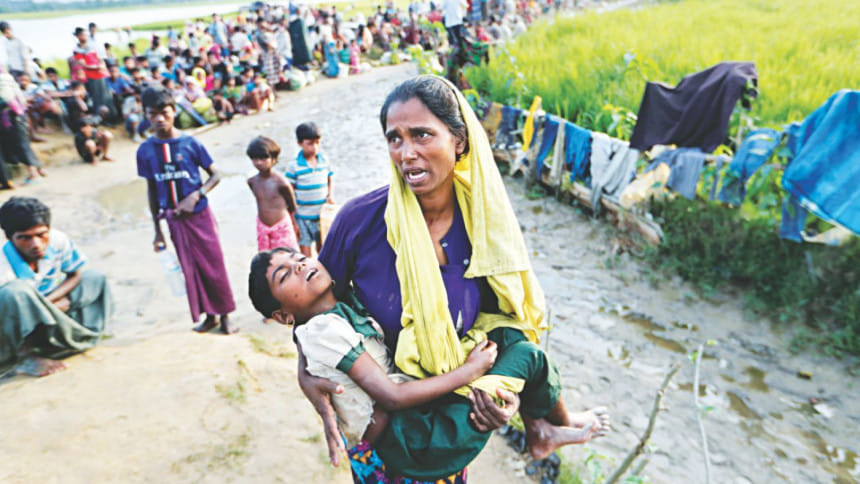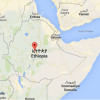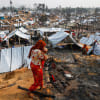World leaders must engage in political process

UN Migration Agency IOM has urged world leaders to engage in a political process that will allow the Rohingya refugees to return home voluntarily, while appealing for additional funds for emergency life-saving assistance.
"And, to do so in conditions of safety, security, dignity and social cohesion, we should insist with Myanmar officials that these conditions are met," IOM Director General William Lacy Swing said at the pledging conference for the Rohingya Refugee Crisis in Geneva yesterday.
"There are no durable humanitarian solutions to political crises and political problems," he said.
However, authorities are in "fierce competition for resources that are very scarce, including resources for those, who are stretched from Africa to South-Asia in armed conflict", he said.
Over 603,000 Rohingyas fled violence in Myanmar since August 25 following Myanmar's security forces operations against them in response to insurgent attacks.
The crisis created a global outcry, but the UN Security Council has failed to take any decisive action against Myanmar, where the Rohingyas are denied citizenship and have been persecuted for decades.
Sharing his experience of visiting Bangladesh last weekend, he said the sheer speed, size and scope of the Rohingya refugee crisis has resulted in a shocking humanitarian emergency that is unparalleled in this region and in many parts of the world.
"We now have approaching 900,000 people being cared for by the Bangladesh Government, people and local communities at great cost to the country, and being done in a very professional way," he said.
The situation therefore requires an unparalleled response from all of us, he told the conference.
Lacy Swing said despite laudable generosity from Bangladesh, host communities, UN agencies and others, aid groups are now faced with a challenge of enormous proportions.
"To be quite frank, everything is a priority. If you had to look at the top priorities, however, it would probably be above all else shelter – building shelter for 900,000 people, 600,000 of whom have arrived in the last two months," he said.
He also noted the need for protection, food security, basic health services and water and basic sanitation facilities.
"So, we need to give our attention specifically today to making sure that the Rohingya refugees are not somehow lost in this arc of suffering across this area of the world", Swing said, stressing on the need to move quickly.
Recommendations of the Advisory Commission on Rakhine state are the way forward to peaceful co-existence in Rakhine state, he said.
"We need to insist that we start implementing these right away, step by step, starting with the first step, which is to allow humanitarians to resume their work in the northern part of Rakhine state."
Thousands of women, children still without basic services
Nearly two months since the beginning of the Rohingya influx, thousands of children and women are still without basic life-saving services, Unicef said.
"The Rohingya refugee crisis shows no sign of abating," said Edouard Beigbeder, the UNICEF representative in Bangladesh.
"The needs of refugees and those of the communities hosting them are increasing at a much faster pace than our capacity to respond. We need more resources and we need them now."
Around 1.2 million people -- including new arrivals, Rohingya refugees who fled Myanmar in previous escalations of violence, and vulnerable Bangladeshi communities -- need humanitarian assistance in Cox's Bazaar. Some 720,000 of them are children.
An estimated 450,000 Rohingya children aged 4-18 years old need education services; 270,000 of them from among the new arrivals, says a Unicef press release.
Nearly 17,000 children with severe acute malnutrition need inpatient and outpatient treatment, and 120,000 pregnant and nursing women need nutritious supplementary food, it added.
There is an acute shortage of water, sanitation and hygiene facilities in the refugee settlements, with an average of 100 people per latrine.
"Given the current population density and poor sanitation and hygiene conditions, any outbreak of cholera or acute diarrhoea, which are both endemic to Bangladesh, could kill thousands of people residing in temporary settlements," Beigbeder said.
Measles has been reported among the settled population as well as the new arrivals. Unicef is working towards accelerating the routine immunisation schedule, which will include the host community.
There are also reports of parents and caregivers who say they are unable to care for their children because of their vulnerable emotional and psychological state, it said.
Many adolescents have taken on additional roles as caregivers and providers, helping with distribution, collection of firewood and caring for their elderly relatives or siblings. At least 900 children are living in child-headed households.
The needs are massive and growing, but funding remains extremely limited, it said.

 For all latest news, follow The Daily Star's Google News channel.
For all latest news, follow The Daily Star's Google News channel. 








Comments